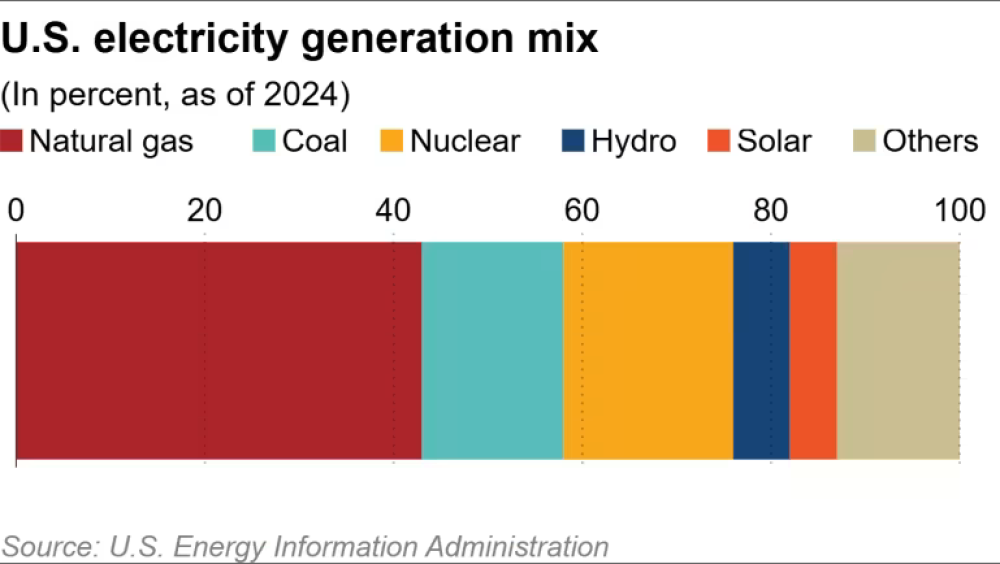

AI khát điện: Bigtech đua nhau dùng điện hạt nhân, Nhật Bản vào cuộc với lò phản ứng hạt nhân nhỏ
-
Các “ông lớn” công nghệ Mỹ như Meta, Amazon, Google và Microsoft đang lên kế hoạch mua tới 14 triệu kW điện hạt nhân trước năm 2040, nhằm phục vụ cho sự bùng nổ tiêu thụ điện từ AI tạo sinh.
-
Mức điện năng này vượt cả công suất điện hạt nhân hiện tại của toàn Nhật Bản (13 triệu kW).
-
Nhu cầu tăng mạnh xuất phát từ dự báo của IEA rằng trung tâm dữ liệu tại Mỹ sẽ tiêu thụ điện nhiều hơn 130% vào năm 2030 so với hiện tại.
-
Điện mặt trời và gió bị hạn chế do tính không ổn định, khiến các trung tâm dữ liệu 24/7 phải chuyển sang dùng điện hạt nhân – nguồn cung ổn định hơn.
-
Meta đã ký hợp đồng 20 năm với Constellation Energy để mua điện từ một nhà máy hạt nhân tại Illinois từ 2027 – nhà máy này vốn định đóng cửa nhưng nay sẽ tiếp tục hoạt động nhờ thỏa thuận này.
-
Microsoft sẽ sử dụng điện từ tổ máy tại Three Mile Island, nơi từng xảy ra sự cố hạt nhân năm 1979, nay được Constellation lên kế hoạch tái kích hoạt.
-
Amazon dự kiến đầu tư ít nhất 20 tỷ USD vào trung tâm dữ liệu tại Pennsylvania, với nhiều cơ sở đặt gần nhà máy hạt nhân để tối ưu hiệu suất truyền tải.
-
Ngoài việc mua điện, các công ty còn tự xây dựng SMR (lò phản ứng mô-đun nhỏ): Amazon hợp tác với X-Energy để đạt công suất 5 triệu kW trước 2039; Google đặt mục tiêu 500.000 kW trước 2035.
-
SMR có chi phí xây dựng thấp hơn lò truyền thống, nhờ các bộ phận được sản xuất hàng loạt trong nhà máy và lắp ráp tại chỗ.
-
Các công ty Nhật Bản như IHI (đầu tư vào NuScale Power) và Hitachi (phát triển SMR với GE Vernova) sẽ hưởng lợi từ xu hướng này nhờ công nghệ và kinh nghiệm vượt trội.
-
Mỹ đang tái kích hoạt ngành công nghiệp hạt nhân sau thời gian dài trì trệ vì tai nạn lịch sử và chi phí cao. Tổng thống Trump đã ký sắc lệnh thúc đẩy việc rút ngắn phê duyệt và cho phép xây dựng nhà máy trên đất liên bang.
📌 Để phục vụ nhu cầu AI đang tăng vọt, các tập đoàn công nghệ Mỹ lên kế hoạch mua và xây dựng hơn 14 triệu kW điện hạt nhân, vượt cả tổng công suất của Nhật Bản hiện nay. Amazon đầu tư 20 tỷ USD, Google và Microsoft cũng vào cuộc. SMR được ưa chuộng vì chi phí thấp và lắp đặt nhanh, mở đường cho doanh nghiệp Nhật như IHI và Hitachi hưởng lợi lớn trong cuộc cách mạng năng lượng dành cho AI.
https://asia.nikkei.com/business/energy/with-ai-use-growing-big-tech-turns-to-nuclear-power
With AI use growing, Big Tech turns to nuclear power

Thảo luận
Follow Us
Tin phổ biến



